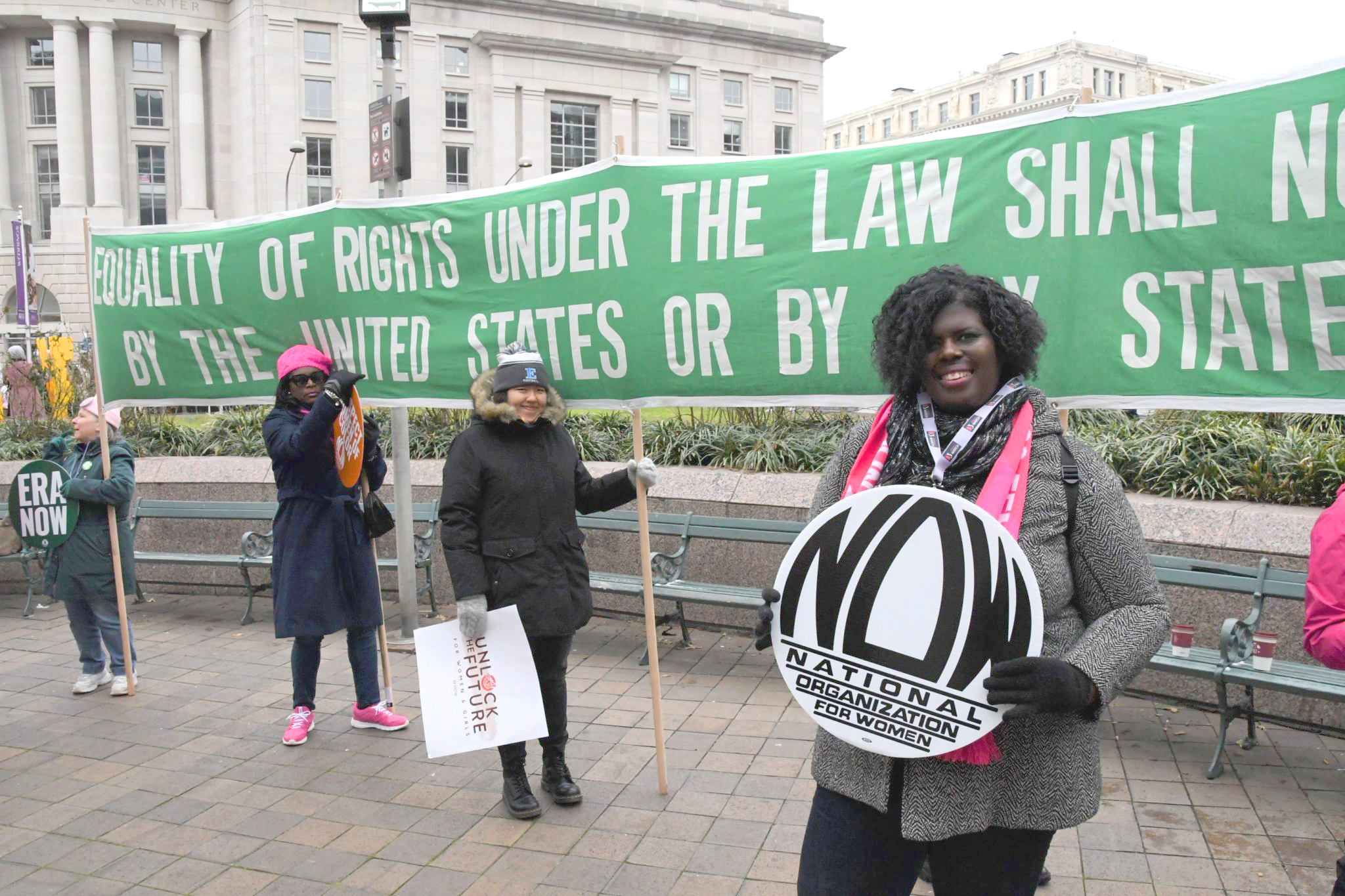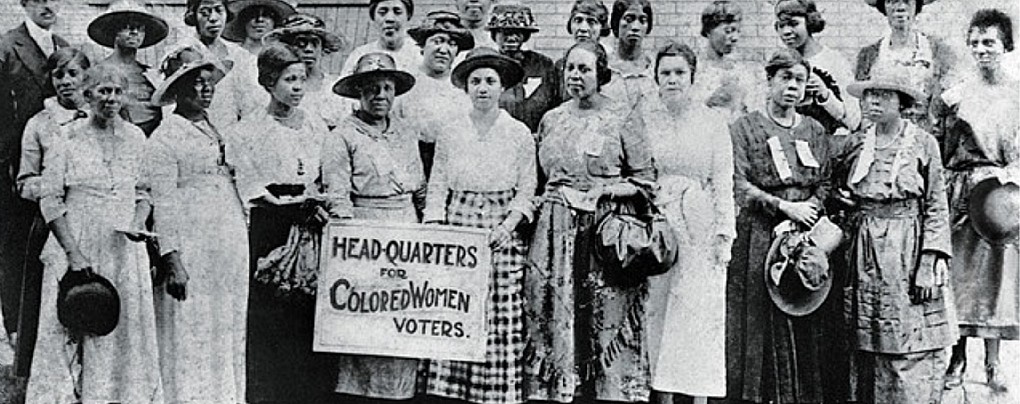Constitutional Equality
When more than half of a country’s population is not equally represented in its constitution, then that country is not living up to its full potential as a democracy. Although much progress has been made, women, BIPOC communities, and the LGBTQIA+ community still face major roadblocks to full constitutional protection in the United States.
From full representation for women to ensuring the fundamental right to vote for all, NOW has always spoken out and demanded that our U.S. Constitution live up to its promise of equal justice under law meaning that no person is entitled to unfair advantages or subjected to unequal penalties based on the law.
For women, BIPOC communities, and the LGBTQIA+ communities, we must take action to ensure constitutional equality. Here are some of the ways forward:
Enshrine The Equal Rights Amendment
“Equality of rights under the law shall not be denied or abridged by the United States or by any state on account of sex.”
– Section I of the Equal Rights Amendment

January 2020 – Women’s March in Washington, DC 1
Women were deliberately left out of the U.S. Constitution as they were not recognized as full citizens in 1787. Even today, centuries after it was enacted, the Constitution does not fully prohibit discrimination on the basis of sex. Sex is not held to the same strict standard as race and religion in the eyes of the law, making it harder for women in court to prove complaints of bias or unequal treatment. That is why the Equal Rights Amendment (ERA) must be added to the Constitution.
NOW is a proud supporter of the ERA. And after a century of advocacy women are now closer than ever to having the ERA enshrined in the U.S. Constitution. The progress we are making toward women’s equality can be lost at any time because those advances depend on legislation that can be (and has been) weakened or repealed by Congress, but the ERA can stop that from happening.
Read more about the ERA:
Ensure Voting Rights For All
The right to vote is central to our democracy and central to constitutional equality. Without free and fair elections, elected leaders can’t claim the consent of the governed.
The 19th Amendment, which we celebrated the 100th anniversary of in 2020, made a promise of suffrage for women, but unfortunately did not provide actual safe access to the ballot box for women of color, nor did it include nationwide suffrage for American Indian women. It took the Voting Rights Act (VRA) of 1965 to finally outlaw discriminatory voting practices that were hijacking our democracy from BIPOC communities. However, these rights have been and continue to be under siege.

The VRA has been essential to preventing voter suppression in communities of color for decades. But in 2013, five Supreme Court justices gutted the pre-clearance provision of this vital law in the Shelby County v. Holder decision, thereby making it easier for certain states to resume racist practices that restrict the voting rights of African American, Latino, Native American, and Asian American people. It is far past time to right this grievous wrong and restore equal access to the voting booths for all Americans, especially women of color.
The 2020 election, like the 2018 midterms, saw historic levels of voter turnout – in the middle of a pandemic. But the urgency and importance that drove voters to the polls was dissipated by organized, unprecedented attacks on the electoral process. These efforts were designed to disenfranchise and suppress Black and brown voters by promoting false claims of “voter fraud.”
NOW proudly stands with our coalition partners to demand that Congress reinstate protections against racial discrimination in voting restore the VRA to its full authority, and to stop voter suppression tactics such as onerous voter ID requirements, the purging of voter rolls, and the dissemination of deceptive information aimed at communities of color. We also need to end the filibuster so that potential laws like the John Lewis Voting Rights Advancement Act and the Freedom to Vote Act can finally be enacted to combat voter suppression laws and ensure voter equality for future generations.
We need fair elections that are protected fully by our Constitution so that the right to vote can never be limited or taken away because of partisan politics.
Read more about NOW’s work on racial justice.
Voting Rights Resources
- Transformative Justice
- 61 Forms of Voter Suppression
- Lawyers’ Committee for Civil Rights Under Law Voting Rights Project
There are numerous pieces of NOW-backed legislation that could help defend access to abortion care until we can see full constitutional protection reinstated: NOW-backed Legislation Defending Abortion Care Access
Visit’s NOW Reproductive Health page.
Guaranteeing LGBTQIA+ Rights and Marriage Equality
LGBTQIA+ rights are one of NOW’s six core issues and NOW is committed to fighting discrimination on the basis of sexual orientation or gender identity in all areas, including employment, housing, public accommodations, health services, child custody, and military policies.
Through the hard work of millions of activists, progress on LGBTQIA+ rights has been made. The Supreme Court recognized that consensual adult sexual conduct is constitutionally protected and that same-sex couples have a constitutional right to marry. In 2020, the Supreme Court ruled that Title VII, which bars sex discrimination in employment, extends to discrimination based on sexual orientation and gender identity as well.
But with every joyful step forward we see powerful extremists rear up and attempt to pull us backward. We are seeing a horrific rise in discriminatory attacks based on gender, including hateful laws targeting students’ gender identity. Some states are even amending their constitutions to limit rights and protections for LGBTQIA+ people, particularly targeting the freedoms of transgender youth.
Furthermore, the constitutional basis for LGBTQIA+ rights has been called into question in light of the Supreme Court’s decision in Dobbs v. Jackson Women’s Health Organization, which removed constitutional protections for abortion. Many advocates fear that this decision could undermine previous Supreme Court decisions finding that states may not criminalize same-sex sexual conduct or that states may not deny the right to marry same-sex couples. Justice Clarence Thomas, in his concurrence in the Dobbs case, explicitly urged the Court to revisit these cases.
A policy brief by Columbia University notes that the ERA, as the 28th amendment, would prohibit states from criminalizing sexual activity between persons of the same-sex when it does not criminalize similar sexual behavior between people of different sexes. Yet another reason NOW supports enshrining the ERA into the Constitution.
LGBTQIA+ people face discrimination in many areas of their lives, including housing, employment, and parenting, and often have no legal recourse since there is no federal law prohibiting such discrimination. That is why NOW also supports the Equality Act, which would provide much needed civil rights protections for LGBTQIA+ people and families.
NOW also seeks to combat the efforts of those who seek to deny equal treatment to LGBTQIA people via constitutional and statutory protections of freedom of religion. According to the American Bar Association, the Supreme Court largely side-stepped these issues in recent rulings in Masterpiece Cakeshop v. Colorado Civil Rights Commission and Fulton v. Philadelphia. But there are still cases on the horizon that could be very dangerous for LGBTQIA+ rights and freedom.
Read NOW’s Statement on the Tennessee Anti-Drag Bill
Visit NOW’s LGBTQIA+ Core Issue Page
The Declaration of Independence asserts this self-evident truth: that each person is born with equal possession of certain inherent rights, such as the right to “Life, Liberty, and the pursuit of Happiness.” How can one pursue such a life without basic representation and basic protections in our founding constitution? That is why Constitutional Equality is one of NOW’s six core issues. We must ensure that all people have true access to the rights and freedom to work, love, and pursue their lives to the fullest without fear of oppression, violence, and discrimination.
Legislative action
With the opening of the 117th Congress on January 3, 2021, the opportunity to pass legislation that would remove the 1972 deadline (and its extension) appears to be within reach. The new administration to be headed by former U.S. Vice President Joseph R. Biden and former U.S. Senator Kamala D. Harris – both supporters of the Equal Rights Amendment and control of the House of Representatives and Senate by Democratic leaders who champion the Equal Rights Amendment, our legislative objective is in sight.
During the previous Congress, the democratic-controlled House of Representatives passed on H.J.Res.79, removing the deadline, by a vote of 232-183, on February 13, 2020. While this action is not required for the ERA to be certified, activists promoted it as “backup” insurance against any future challenges. Constitutional experts have noted that Article V, the section pertaining to amending the Constitution, is silent on the matter of ratification deadlines as to whether they have any actual force, especially if not included in the specific amendment language. The ERA deadline appears in the preamble or proposing clause, not the actual language of the Amendment. Since the Constitution offers no guidance, the decision could be made by the courts.
Unfortunately, the Republican-led Senate took no action on the House bill or the companion measure, S.J. Res. 6: A joint resolution removing the deadline for the ratification of the equal rights amendment, sponsored by Maryland Sen. Ben Cardin (D), with Republican Sen. Lisa Murkowski and 32 bipartisan co-sponsors. Both measures will be re-introduced in the current Congress. It is important for all ERA supporters to let members of their Congressional delegation know that we would like them to pass such legislation.
What do we do next?
Ways to take action:
- Call or write your Representative and both Senators to urge that they support removing the ERA deadline. Legislation sponsored by Rep. Jackie Speier (D-Calif.) and Sen. Ben Cardin (D-Md.) will be introduced soon. You can check at congress.gov
- Speak out on social media in support of the ERA using this tool kit (Updated version coming soon).
- Get informed
- NOW’s History With the ERA: Press Statements, Action Alerts, and Blogs
- The ERA Lives On! Three AG’s File Notice to Appeal District Court Ruling – May 4, 2021
- Additional Resources from our partner organizations:
Click here for all Photo Credits on ERA pages.
Blog
The US Supreme Court Blocks the Trump Administration’s Attempt to End the DACA Program; Dreamers are Here to Stay
June 22, 2020 Last Thursday, the Supreme Court of the United States delivered a 5-4 ruling blocking the Trump administration’s attempt to end the Deferred Action for Childhood Arrivals (DACA) program, an Obama-era program shielding undocumented immigra Read more...NOW Grassroots Victories in 2014
2014 has been a busy year for NOW! Our grassroots activists have been hard at work, refusing to stay silent as conservatives attempt to deny women their rights. From Alaska to Louisiana, New York to Texas, Rhode Island to Missouri, activists across t Read more...NOW Chapters Fight for Rights, Work to GOTV

News
Latina Equal Pay Day: How Employers Can Close the Pay Gap
According to Nunes equal pay “isn’t just the right thing to do, it’s the best investment we can make”. Read more...NOW Hails House Passage of Women’s Health Protection Act
The passage of the Women’s Health Protection Act (WHPA) would put the reproductive rights protected by Roe v. Wade into federal law. Read more...NOW Applauds Biden Administration for Prioritizing Gender Equality
WASHINGTON, D.C. — As we celebrate International Women’s Day, the National Organization for Women (NOW) applauds President Biden’s new executive orders, which are a major advance towards gender equity and gender equality here in the United States. Th Read more … Read more...NOW Celebrates International Women’s Day
WASHINGTON, D.C. – The National Organization for Women takes this International Women’s Day to acknowledge and celebrate the accomplishments of women around the world and the obstacles we have had to overcome on the journey. This year has been a diffi Read more … Read more...Resources
Is the Equal Rights Amendment Relevant in the 21st Century?
The language of the 1972 Equal Rights Amendment as ratified by 35 states: Section 1. Equality of rights under the law shall not be denied or abridged by the United States or by any State on account of sex. Section 2. The Congress shall have the power to enforce, by appropriate legislation, the provisions of this article. Section 3. This article shall take effect two years after the date of ratification.
RFRA Laws Undermine Civil Rights, Child Protection and Domestic Violence Laws
Those advocating for the bill are only concerned with protecting hateful and intolerant religious zealots and completely unconcerned with how this potential discrimination will infringe on the rights of other people, namely the LGBTQIA community, children, domestic violence victims and others.
Chronology of the Equal Rights Amendment, 1923-1996
A timeline history of the ERA’s history and NOW’s activism on the issue.
Removing the Deadline for the Ratification of the Equal Rights Ammendment
The deadline for the ratification of the Equal Rights Movement has been removed.